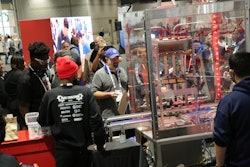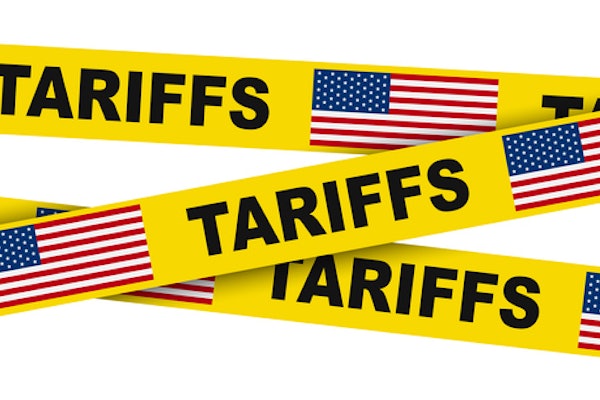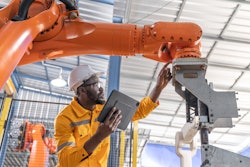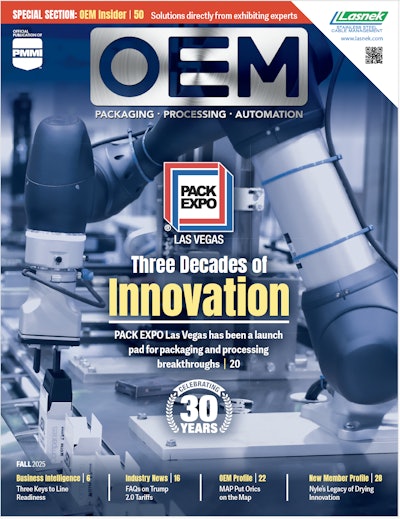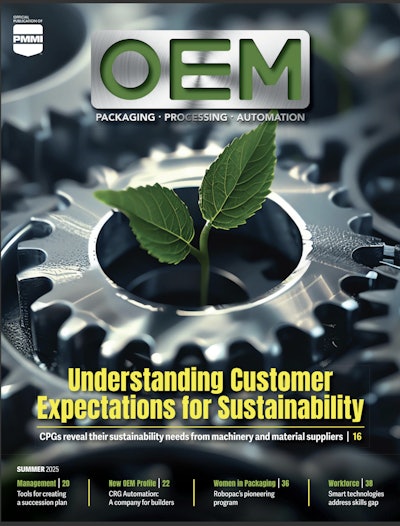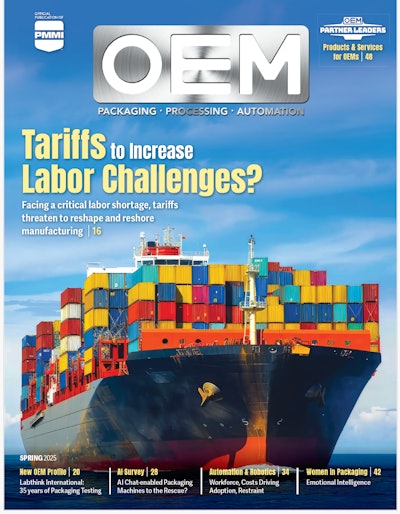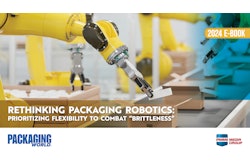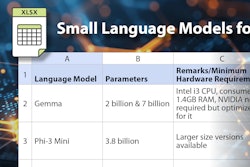In this episode, Rebecca Marquez returns to share strategies for tackling the workforce crisis in manufacturing. From smarter operator training and AI insights to intuitive machine design and OEM collaboration, learn how to prepare for the next five years—and how PACK EXPO Las Vegas can help turn these strategies into action.
Sean Riley: In this episode, Rebecca Marquez returns to share strategies for tackling the workforce crisis in manufacturing. From smarter operator training and AI insights to intuitive machine design and OEM collaboration, learn how to prepare for the next five years—and how PACK EXPO Las Vegas can help turn these strategies into action.
So with all the fancy introductions out of the way, welcome to the podcast, Rebecca.
Rebecca Marquez: Thanks for having me.
Sean Riley: Oh, the pleasure is always ours. You've become a regular guest here on our little show. So we've covered workforce a lot. We talk about it all the time now. It's a crisis, particularly in manufacturing. I don't want to specify a number, but I know there are well over a million unfilled jobs out there. There's a lot, and we touch on that a bit, so I want to take it from a different angle and see what you see that the industry can do differently to address these workforce gaps in the next five years, looking forward. Because we've been hearing about these problems for five, ten years, how can we fix them in this short window of the next five years?
Rebecca Marquez: I think one thing that I've been hearing constantly, and I think maybe you've been hearing it too, is that we need to rethink the training of operators. Have you been hearing that as well?
Sean Riley: Yeah. A lot of talk about visual and video.
Rebecca Marquez: Exactly. What I hear from end users quite a bit is that we just need to prioritize better training support. We need to think about training as more long-term, beyond just installation. It can't just be three days or one week of training, and then you never get any training beyond that. We're also hearing a lot about, you mentioned videos, embedding short videos right onto machinery or just embedding different things onto machinery, like multilingual guides, interactive lessons, and just putting them right on the machinery or right on the HMI.
Another thing that we've heard that I think is really interesting is that a lot of times, when you have training at installation, it's an SME that performs the training. It's not necessarily someone who specializes in training.
Sean Riley: Right.
Rebecca Marquez: And so I don't know if you've heard this, but a lot of times, the SME will be really familiar with the machinery that's being installed. They know all of the ins and outs, the quirks, the shortcuts, all of that, and they're not necessarily as thorough in training new operators.
Sean Riley: Yeah, I could see that.
Rebecca Marquez: And so really what some end users are looking for is to have not just engineers, but real trainers, real operators that know how the machine operates or how it should be operated to conduct the training at installation, and even continuing training because SMEs are not always the best choice. So that's what people are looking for. That's what I've been hearing from end users.
Sean Riley: Yeah, it makes sense. There's also a problem retaining workers. It would make sense that you would continue to train them so that they don't feel like they don't know what they're doing, which is probably happening in some cases where machinery is updating so fast that someone who might've been an operator was well-trained previously, but as the machinery has evolved, they need someone to keep them up to speed so that they can evolve with it.
Rebecca Marquez: Exactly, and that's why people are looking for continuity in training. I want to mention customized training, too. It's not one size fits all.
Sean Riley: Nope.
Rebecca Marquez: Companies and operators are different. Everyone learns in a different way, and so there are differences even regionally. Customized training is a good approach, but it doesn't seem to be really in existence right now. I have also heard that from end users. It would be great to have that available to them.
Sean Riley: So, like everything else to do with a relationship, there has to be a collaboration throughout, not just the machine process, but now the training after the machine gets into the plant.
Rebecca Marquez: Absolutely.
Sean Riley: Okay. What skills do you think will be most in demand or will be necessary for the workforce in packaging and processing through 2030?
Rebecca Marquez: 100% technical proficiency.
Sean Riley: Yeah.
Rebecca Marquez: Without a doubt. And I know you've heard that, and you've had guests talking about what will be absolutely looked for in the future. Skills in automation systems.Troubleshooting. Data interpretation and cross-functional operations will dominate the demand for workforces in the future, in the next few years. Operators are going to have to know how to read digital diagnostics. They're going to have to understand AI-driven insights.
Sean Riley: Sure.
Rebecca Marquez: They're going to have to know all of that stuff. Another thing is informal knowledge, and that's just training or knowledge that you get over time. Familiarity, I guess you could just call it.
Sean Riley: Yeah.
Rebecca Marquez: But that kind of knowledge is really highly valued, and that actually just comes from retention, people working with something for a while. So retention is really important. That's going to be important as well, but companies are going to be looking for those kinds of skills, technical skills. Another thing that's really important that we've been hearing is peer coaching and mentoring, because there's going to be a lot of collaboration in the future, too. And so I think that companies are going to look for those kinds of skills in some of their operators as well because they want to embed those skills in daily work.
Sean Riley: Very good. I like that. Which makes sense with the turnover and the different workforce that's coming in, that there would be some mentorship, which again, you're going to look for from a retention standpoint as well. So you touched on a bunch of the, but what would you say is the technology or innovation that's come about recently that's had the most impact on operations and affecting the workforce?
Rebecca Marquez: So far, it's the ones that we've talked about. It's onscreen instructions, video, platforms that contain video content, or simulators, things like that. There are other things that take into account low-skilled workforces that have been very impactful, like color-coded parts, flashing alarms, checklists, things like that that can help reduce errors. But I think the big thing really is just visuals, video, simulators, things like that, that are easily accessible to operators. Either on the HMI, or on the machine itself, it's just easy for the operator to gain access to and get an answer quickly. One of the interviews that I conducted said that one of the changes she's seeing is that we live in the TikTok generation.
Sean Riley: Sure do.
Rebecca Marquez: We are conditioned to get an answer immediately, within five seconds or whatever it is, so a manual is not going to cut it anymore. Even going to YouTube these days might take too long, so something that's really quick and easily accessible is going to be the wave of the future, for sure. And what's out there already has had a huge impact.
Sean Riley: Where do you see AI and machine learning making the biggest difference in operations, where it's going to help out the workforce?
Rebecca Marquez: I think the biggest differences that it's making are in predictive maintenance, for sure. But there are other places where it's been really beneficial. One is reducing downtime, certainly. Also, AI is being used to find recurring faults in machinery, and it can find them in real time, and it can target fixes in machinery. That's another way it's being used. Mostly, I think it's predictive maintenance so far, but there are other ways it is slowly creeping into our operations.
Another thing that I've heard is that it's being used to guide operators in real time. We get a lot of questions about reports that we've done on AI, and we're getting there. It's not hugely adopted yet, but we're getting there. We talked about customized training. That's another way that AI could be used. Not so much yet. Maybe a little bit of usage or a little bit of experimentation, but it can actually learn from operator usage.
Sean Riley: That sounds like it would be a huge win and a huge help for some of the things you were talking about earlier.
Rebecca Marquez: Exactly.
Sean Riley: Awesome. I like that a lot. That's exciting. And speaking of exciting, what excites you the most about the future of manufacturing and its role in workforce development
Rebecca Marquez: I think a couple of things are really exciting. I love anything interactive.
Sean Riley: Yeah.
Rebecca Marquez: And I think a lot is going on for interactive training, which I think is really cool. AR and VR were all the rage, then it calmed down a little bit, but we're still seeing AR and VR support, which I'm also really excited about. I like self-guided learning, not as excited about that, but let's see what happens with it. Let's see what format it takes.
Sean Riley: Okay, we'll keep an eye on it.
Rebecca Marquez: It could be really cool. I'm hearing people talk about it, but let's see what happens with it. And then there is also just building machines or creating an HMI that is as intuitive as a smartphone. An operator from any walk of life can pick that thing up, and it is so intuitive that they will be able to operate that equipment in no time, and that's really exciting.
Sean Riley: Yeah, I've heard that from the perspective of an iPhone. Who taught you how to use this? Basically, everybody knows how to use it. We've all been using them for years, and if you can incorporate that into a machine or onto an operation, the entire line like that, then basically, you're having something that anybody can work on.
Rebecca Marquez: With all the turnover, and hopefully that will slow down someday. We don't really see it slowing down anytime soon. It's going to continue to be an issue for a while, but yeah, we're going to need equipment like that. We're going to need platforms like that. We're going to need HMIs like that, so that anyone can pick up and just intuitively know how to use them to operate machinery.
It can be done, like you said, on an iPhone. Nobody taught you how to use it. People just know how to use it, and it's easy to figure out if they don't know right away. I find that really exciting because HMIs right now, some of them are very complicated, and it doesn't need to be that way. We actually conducted a meeting not too long ago, and we were talking about training, and one of the things that our meeting audience talked about in an interactive session, as far as training, they talked about including training tips or finding training information on the HMI.
The whole audience voted on this, and they thought it would be the most useful thing. We know this can be done, and we know it's a need, so I think this can happen, and I think it's going to be really cool when it does.
Sean Riley: Very cool. We've hit on a bunch of topics, but we'd be remiss if we didn't touch on PACK EXPO Las Vegas, which is obviously coming up. How can people take advantage of a show like PACK EXPO Las Vegas to address things like this technology, workforce gaps, and other issues of that nature?
Rebecca Marquez: There are all sorts of stuff at PACK EXPO, as it's a never-ending show. There are so many vendors there. One thing that's really good to do is get the exhibitor search tool. That's a good place to start. One pavilion that would make sense for the topic that we're discussing might be the logistics pavilion, because that's going to contain vendors for warehouse automation, things of that nature. But we don't necessarily have a pavilion specifically for this topic. It's all over the show.
So I would really start with the exhibitor search function on the website. I would encourage you to just talk to your vendors and just learn about what they have to offer. Learn about their support tools. That's really important because that's a lot of what we're talking about. How can OEM support these folks? And ask them about how AI is enhancing their platforms. What are they doing, and how are they using it, and how are they using training? And then find out how flexible they are in collaboration, because I think we're getting closer to where OEMs and end users are collaborating on these projects. I think it's really important. I've been with PMMI for almost nine years. I've been hearing about collaboration and the importance of collaboration for the entire time.
Sean Riley: Yep.
Rebecca Marquez: It seems like we're getting there. I understand you have a seller and a buyer position, so there's a natural division there. But I think it's really important because I've heard really great success stories when it does happen.
Sean Riley: From companies that do it, yeah.
Rebecca Marquez: Honestly.
Sean Riley: When you build a partnership, it always works out better.
Rebecca Marquez: Exactly. So find out how flexible these OEMs are in collaborating with you to build solutions and see what they're doing because if you can find somebody who aligns with you and your needs, it's only going to lead to success, honestly.
Sean Riley: Yep. Absolutely. This was great. Thank you again, Rebecca, for taking time out of your day to come on here with us. It's always a pleasure.
Rebecca Marquez: Sure thing.





